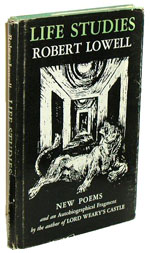Commander Lowell
by Robert Lowell
1887-1950
There were no undesirables or girls in my set,
when I was a boy at Mattapoisett—
only Mother, still her Father’s daughter.
Her voice was still electric
with a hysterical, unmarried panic,
when she read to me from the Napoleon book.
Long-nosed Marie Louise
Hapsburg in the frontispiece
had a downright Boston bashfulness,
where she grovelled to Bonaparte, who scratched his navel,
and bolted his food—just my seven years tall!
And I, bristling and manic,
skulked in the attic,
and got two hundred French generals by name,
from A to V—from Augereau to Vandamme.
I used to dope myself asleep,
naming those unpronounceables like sheep.
Having a naval officer
for my Father was nothing to shout
about to the summer colony at “Matt.”
He wasn’t at all “serious,”
when he showed up on the golf course,
wearing a blue serge jacket and numbly cut
white ducks he’d bought
at a Pearl Harbor commissariat . . .
and took four shots with his putter to sink his putt.
“”Bob,” they said, “golf’s a game you really ought to know how to play,
if you play at all.”
They wrote him off as “naval,”
naturally supposed his sport was sailing.
Poor Father, his training was engineering!
Cheerful and cowed
among the seadogs at the Sunday yacht club,
he was never one of the crowd.
“Anchors aweigh,” Daddy boomed in his bathtub,
“Anchors aweigh,”
when Lever Brothers offered to pay
him double what the Navy paid.
I nagged for his dress sword with gold braid,
and cringed because Mother, new
caps on all her teeth, was born anew
at forty. With seamanlike celerity,
Father left the Navy,
and deeded Mother his property.
He was soon fired. Year after year,
he still hummed “Anchors aweigh” in the tub—
whenever he left a job,
he bought a smarter car.
Father’s last employer
was Scudder, Stevens and Clark, Investment Advisors,
himself his only client.
While Mother dragged to bed alone,
read Menninger,
and grew more and more suspicious,
he grew defiant.
Night after night,
à la clarté déserte de sa lampe,
he slid his ivory Annapolis slide rule
across a pad of graphs—
piker speculations! In three years
he squandered sixty thousand dollars.
Smiling on all,
Father was once successful enough to be lost
in the mob of ruling-class Bostonians.
As early as 1928,
he owned a house converted to oil,
and redecorated by the architect
of St. Mark’s School . . . . Its main effect
was a drawing room, “longitudinal as Versailles,”
its ceiling, roughened with oatmeal, was blue as the sea.
And once
nineteen, the youngest ensign in his class,
he was “the old man” of a gunboat on the Yangtze.
Stephen Yenser on “Commander Lowell”
There is no denying that Lowell’s “study” of his father is not wholly complimentary. A Navy man whose interest in ships is basically academic, whose main connection with Pearl Harbor is that he once bought “white ducks” at the commissary there, and whose way of celebrating giving up naval life for a position with Lever Brothers’ Soap is to sing “‘Anchors aweigh'” in the bathtub, he is bound to appear somewhat ridiculous. The only time he displays a “seamanlike celerity” is when he leaves the Navy—only to squander a small fortune in the less secure civilian world. A revelation of facts such as these constitutes an indictment, and Lowell is not stingy with them.
At the same time, these observations are placed in a context that takes the edges off them and that even manages to return to the Commander some of the dignity that his rank implies. One of Lowell’s resources here is the memory of the characters of the people who surrounded his father, so that the latter’s weaknesses are in part explained and in part transformed. For example, we know from numerous references that his father was not altogether a satisfactory husband, and we may be inclined to read as further confirmation of this inadequacy the comment that “Mother dragged to bed alone, / read Menninger, / and grew more and more suspicious”; but our response to this comment must be qualified by the opening lines of the poem . . . .
The barely suppressed Freudian interpretation of his mother does much to explain and perhaps even to justify his father’s fecklessness. The fact that she read “the Napoleon book” to her son is not meant to go unnoticed; and the very circumstance that a poem purporting to be about his father opens with such pointed remarks about his mother is significant. If it will not do to see the older Lowell as a hapless victim of a domineering wife, neither will it do to view him as the family liability. The situation is too complex to be reduced to such stock explanations; and what Lowell does is to play one character against the other, letting the real situation emerge in the course of this interplay. Much the same thing happens in the second stanza, where the Commander’s inability to mix with his contemporaries is set forth. Not to fit in with the country club set, who incongruously regard golf as the game of professionals, and not to be one of the yachting crowd, who ludicrously see themselves as “seadogs” on Sundays, are almost laudable characteristics. It is easy to think it a blacker mark that he was “once successful enough to be lost / in the mob of ruling-class Bostonians.” Rather than a type of failure, Commander Lowell might be regarded as a type of hero, although a decidedly Quixotic type. But even the humor of condescension that is accorded a Quixote is banished from the last lines of this poem.
Excerpted from Circle to Circle: The Poetry of Robert Lowell. Copyright © 1975 by the Regents of the University of California.



No Comments